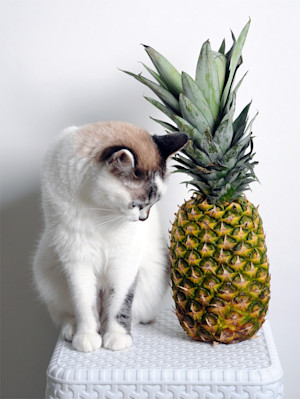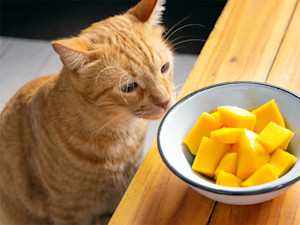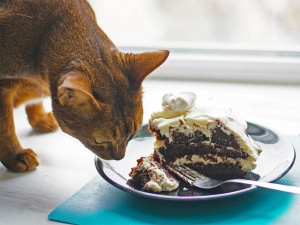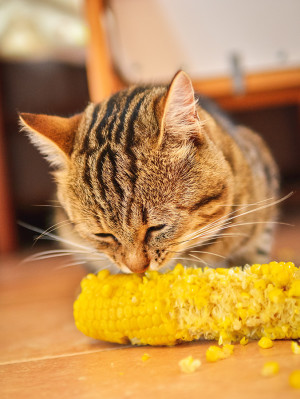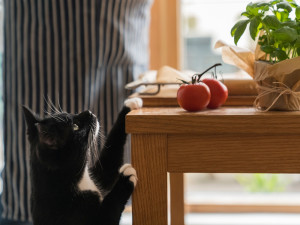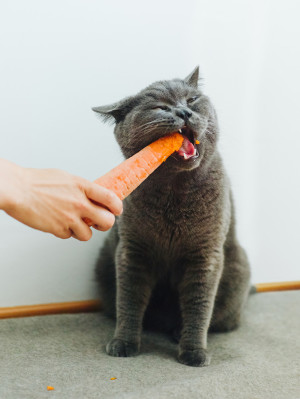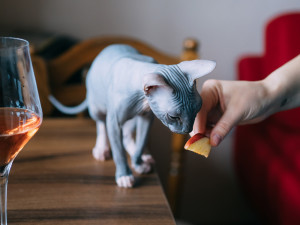If you’re lucky enough to come across a perfectly sweet, ripe, peach, you may not want to share it with anyone, but then again, your cat isn’t just anyone. Your feline soulmate may be hard to resist if they are staring up at you with those big cat eyes.
The good news is that yes, cats can eat peaches (in small amounts). They may not appreciate the delicious flavor of a peach, though, so you may not want to share it after all. Read on to learn all about peaches and cats.
Nutrition facts about peaches for cats
Peaches are the fruit of the Prunus persica tree. They are considered stone fruits, or drupes, which describes any fleshy fruit with a large solitary pit in the center. Peach trees are native to Asia and are now farmed in many parts of the world. The trees can be very large, up to 25 feet tall, and are vulnerable to many insects. Fresh peaches contain a lot of water and are low in fat. They also contain natural sugars, fiber, vitamins, minerals, and potent antioxidants. Some of these nutrients can be beneficial to cats.
Are peaches good for cats?
Peaches are not considered good for cats in that they are not part of a cat’s natural diet and lack many of the nutrients cats require for good health. This is because cats are obligate carnivores and their bodies are built for eating whole prey. They require certain animal-based nutrients to meet all of their needs. For cats who are not hunting for their meals, this means they need to eat a complete and balanced cat food diet that is designed to meet their needs. That said, if you have a cat who is curious about peaches, it’s safe to let them try small amounts of the fruit as an occasional snack. Some of the health benefits cats can get from peaches include:
How much do you spend on your pet per year?
Hydration: Peaches contain a lot of water which can help keep your cat hydrated. Cats typically do not drink much water and if you have a cat with certain health conditions, like kidney disease or urinary problems, you may need to find creative ways to increase their water intake.
Fiber: Peaches are high in fiber, especially the skin of the fruit. Fiber is important for bulking up the stool, preventing constipation, and providing nutrients to the gut microbiome.
Vitamins and minerals: Peaches contain vtamin A, vitamin E, and vitamin K along with potassium, manganese, copper, and niacin. These vitamins and minerals are all vital to everyday life and biological functions. A complete-and-balanced cat food diet will contain all of the necessary vitamins and minerals your cat needs daily, so anything extra they get from snacks and treats is a bonus.
Antioxidants: Peaches are especially rich in caffeic acid and carotenoids, which are both potent antioxidants. These compounds help to prevent DNA damage from free radicals, which may help to slow the aging process and protect against certain chronic diseases and some forms of cancer.
Can cats eat any part of a peach?
Cats can only safely eat the flesh of the fruit; all other parts of the peach and tree are considered to be toxic. This is because all parts of the plant, including the pit, leaves, and stems contain cyanide, which can cause serious illness in large amounts.
Most cats will not consume enough of the plant to experience the most serious effects, however, it is better to play it safe and keep it out of reach. Wilted leaves tend to have higher concentrations of cyanide than fresh leaves so even these should be discarded. Signs of cyanide toxicity include respiratory distress, dilated pupils, seizure, coma, or even death.
Are peaches completely safe for cats?
The fruit of the peach is safe for cats in moderation, but there are a few important points to keep in mind:
High in fiber: Fiber has many important health benefits; however, if too much is consumed, it can cause diarrhea, bloating, and gas. It is important to offer only small amounts of high fiber foods to your cat, especially if they are not accustomed to them.
High-sugar content: Peaches contain natural sugars which cats cannot metabolize very well. They also lack the taste buds to taste sweet flavors so they may not appreciate sweet foods anyway. Too much sugar puts cats at risk for weight gain and related health problems like diabetes and/or arthritis.
Added ingredients: If you are considering sharing peaches with your cat that are part of a prepared dish or have other ingredients, be sure none of them are toxic to cats. Many peach-based dishes also have added sugar, syrup, cinnamon, nuts, and/or dairy which are not healthy for cats and should be avoided.
Choking hazards: Large pieces of peaches, and especially peach pits, may become choking hazards if cats try to swallow them whole. Be sure to remove the pit and offer only bite-sized pieces of ripe fruit to your cat. Peach pits are also notorious for causing intestinal blockages if swallowed so they should be kept out of reach.
The bottom line: Can cats eat human food?
Cats can eat some human foods, but it is important to remember that cats and humans have very different nutritional needs and preferences. While some of us may be straight herbivores or carnivores, biologically all humans are omnivores and can obtain the nutrients they need by eating both plant and animal-based foods. On the other hand, all cats are obligate carnivores, which means they need to eat an animal-based diet to meet their nutritional needs. The best way to ensure your cat has a healthy diet is to focus on providing a high quality, complete and balanced cat food diet for them.
The occasional treats and table snacks are OK but should not be more than 10 percent of your cat’s total intake. This ensures that your cat gets all of the nutrients they really need without being overfed and at risk for unhealthy weight gain. Since many cats live exclusively indoors, they can also be underactive, contributing to weight gain and a sedentary lifestyle as well. Be sure to dedicate time to play with your cat each day, plan creative ways to include enrichment in their routine, and try to use treats to motivate them to be more playful and active. By combining a healthy diet with a fun and active lifestyle, you can help your cat live their healthiest and happiest life.
Other foods that are safe for cats
Cucumbers can be a refreshing treatopens in new tab in moderation.
Shrimp can be a tasty treat opens in new taband a high protein boost.
Strawberries and other berries opens in new tabare lower in sugar than many fruits and can be a good choice for cats.
Other foods that are dangerous
Butter is not good for cats and should be avoided.
Grapes and raisins are toxic to cats and cannot be shared.
Onions, garlic, and all plants in the Allium family are also toxic to cats.
FAQs (People also ask):
How many peaches can a cat eat?
Cats should only eat small portions of peaches, as they are high in fiber.
Is it OK to give cats peaches?
The flesh of the fruit is safe for cats to eat.
Why do cats like peaches?
Cats may like the texture and/or smell of peaches. They are also hydrating.
Can cats eat any part of the peach?
Cats can only eat the fruit of the peach; the rest of the plant and pit are considered toxic.


